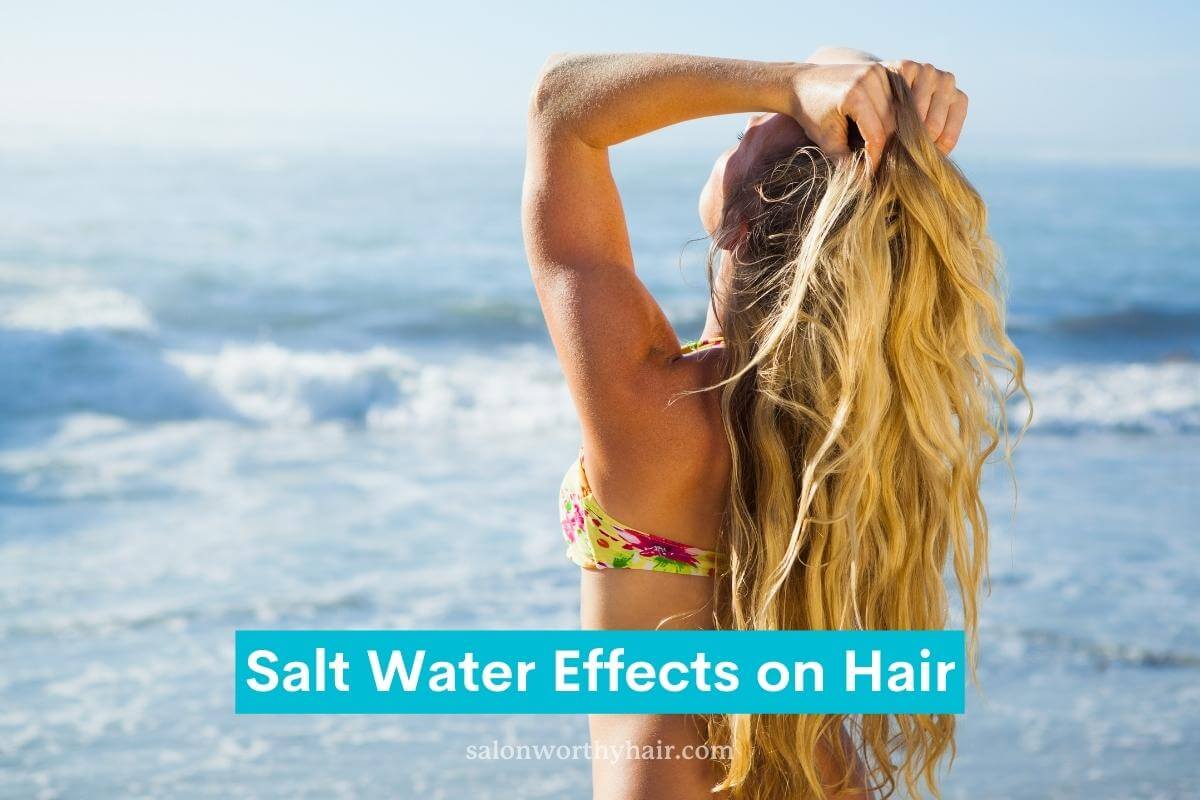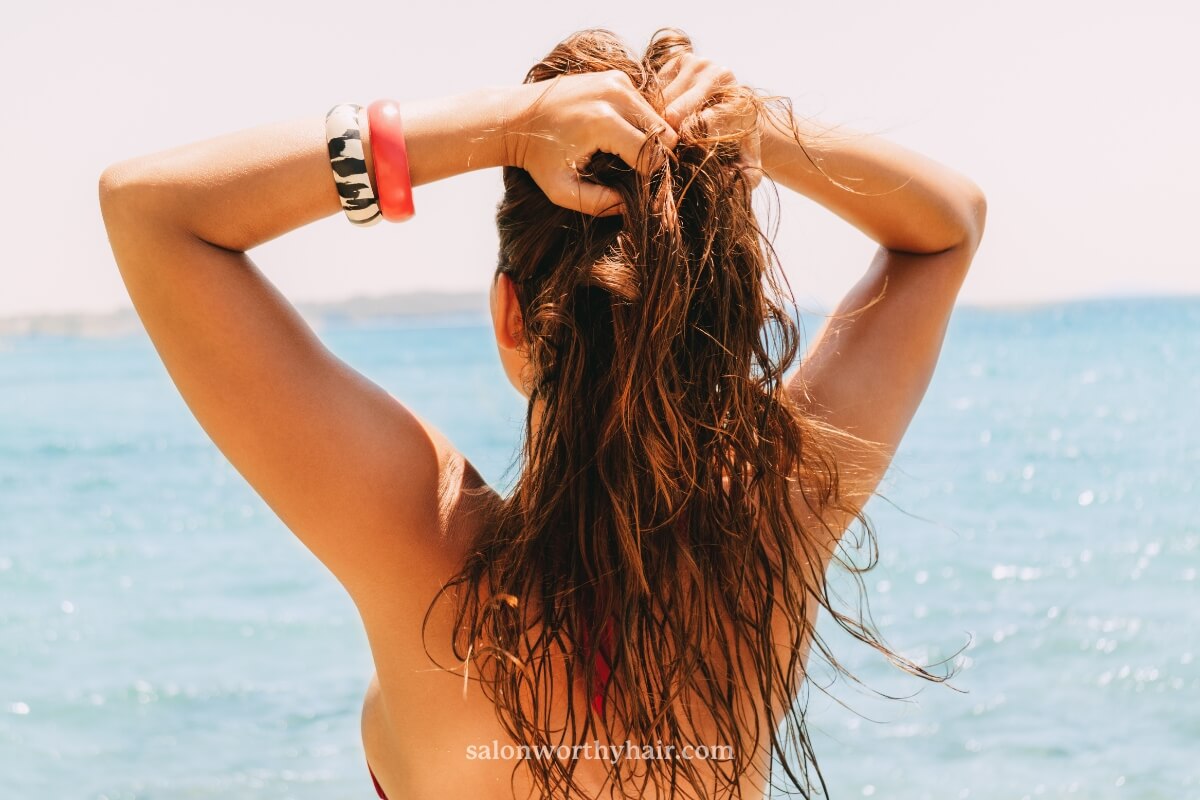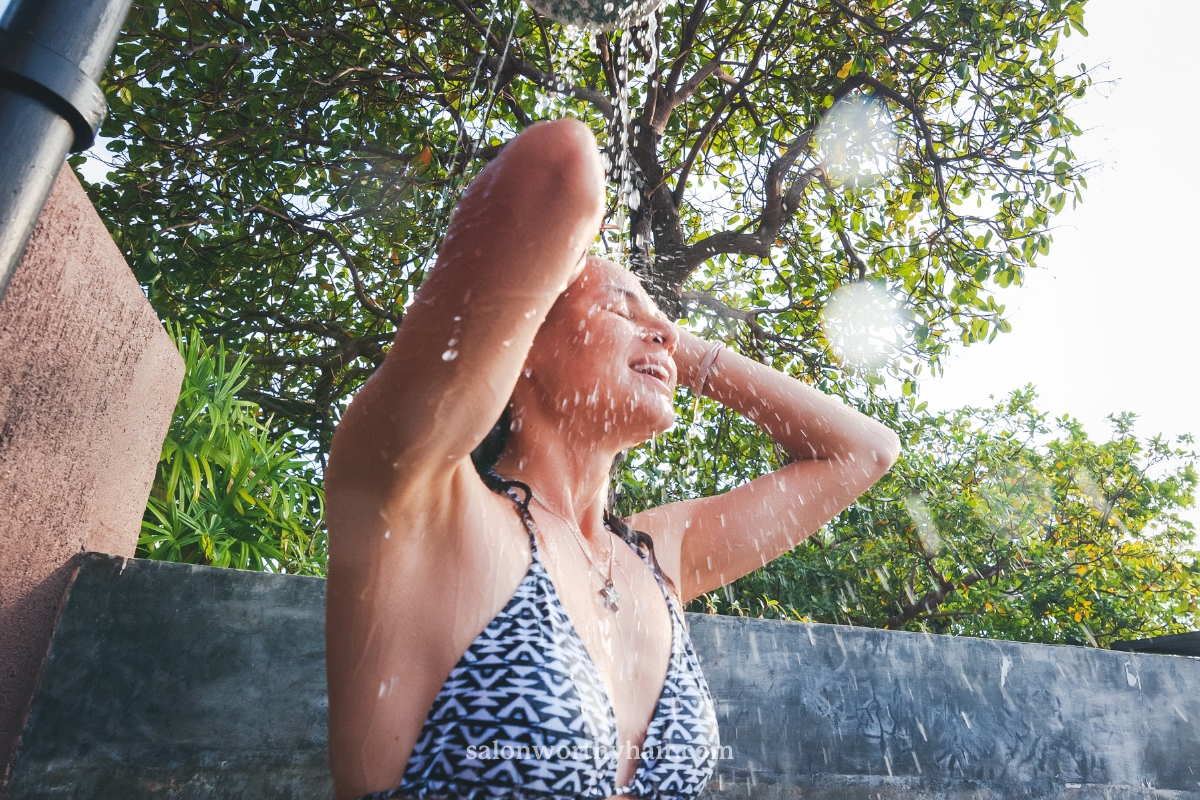Is Salt Water Good for Your Hair? Benefits and Risks Explained
Updated on
This post may contain affiliate links. As an Amazon Associate, we may earn from qualifying purchases.

There’s something magical about a day spent at the beach. The sun, the sand, and the soothing sound of crashing waves all work together to create the perfect escape from everyday life. Of course, one of the most coveted beachside perks is the effortlessly gorgeous, tousled waves that seem to come naturally after a dip in the ocean.
But is salt water good for your hair?
The answer is not straightforward, as salt water can have both positive and negative effects on your hair.
In this blog post, we’ll dive deep into the science behind salt water and its effects on your hair, analyzing whether salt water is good for your hair or not and weighing the pros and cons of its exposure. We’ll also provide tips for protecting your hair from potential damage, as well as share salt water alternatives for hair care that you can enjoy without setting foot on the beach.
Short Summary:
- Salt water can give hair beautiful beachy waves with the right care and protection.
- Enjoy nourishing benefits for scalp health, such as improved growth and exfoliation, without facing dehydration or dryness.
- Protect your hair from potential damage by using pre-treatment solutions & post swimcare products, plus sun protection techniques like SPF cream & hats/caps.
The Science Behind Salt Water and Hair
Salt water is more than just a catalyst for beautiful beachy waves. In fact, it contains elements that create extra crosslinks within hair strands, causing them to curl and curve. These crosslinks are responsible for the coveted beachy waves that many of us associate with a day spent by the ocean. However, the relationship between salt water and hair is a complex one, with both pros and cons to consider.

To better understand the effects of salt water on hair, let’s delve into the science behind it, exploring the formation of beachy waves, the potential for dehydration and dryness, and the impact of nutrients and scalp health on hair quality and appearance.
Formation of Beachy Waves
The formation of beachy waves can be attributed to the unique chemistry of sea water, particularly the presence of salt. When hair is exposed to salt water, the salt crystals form extra crosslinks within the hair strands, resulting in the characteristic curling and curving of beach waves. This process can also contribute to a smoother hair surface and a pleasant texture, as the hard crystals formed by the salt in seawater develop mechanical abrasion to the cuticle, reducing tangling between adjacent hairs.
While the formation of beachy waves is certainly an appealing aspect of salt water exposure, it’s important to remember that this effect can also lead to dryness and brittleness if hair is constantly exposed to sea water. By understanding the science behind these waves, we can take steps to protect our hair while still enjoying the benefits of sea water.
Dehydration and Dryness
While sea water can provide hair with essential minerals, contributing to healthy and strong hair, its dehydrating effects can’t be ignored. Sea water can attract water from hair strands, forming salt crystals that leave hair feeling dry and brittle.
However, there is a silver lining to this dryness: the magnesium present in sea water can be absorbed through the scalp, helping to strengthen the nervous system and reduce stress for better hair growth.
To enjoy the benefits of sea water without the negative effects of dehydration and dryness, it’s important to properly care for your hair before and after exposure. By taking the right precautions, you can achieve the perfect balance of beachy waves and healthy, hydrated hair.
Nutrients and Scalp Health
Salt water can affect one’s hair in various ways. It can lead to both benefits and drawbacks for hair health. On one hand, it can add body and volume to hair, while on the other hand, it can also make hair dry and susceptible to moisture loss. However, when used in moderation, salt water can provide nourishing nutrients and benefits to the hair and scalp.
For example, the magnesium in salt water can help fortify the neural system, which has been associated with improved hair growth. Additionally, salt water can serve as an outstanding exfoliant for the scalp, clearing away product accumulation from hair roots and invigorating blood flow.
By understanding the impact of nutrients and scalp health on hair quality, we can make informed decisions about how to best care for our hair when enjoying the benefits of salt water.
Pros and Cons of Exposing Hair to Salt Water
As we’ve seen, there are both pros and cons to salt water exposure. The benefits of salt water can include a boost in volume and texture, as well as antifungal and exfoliating properties that can help maintain a healthy scalp. However, constant exposure and increased temperature can cause hair damage, such as dryness, brittleness, and stripping of natural oils and moisture.

Let’s take a closer look at the specific advantages and disadvantages of salt water exposure, as well as tips for making the most of its benefits while minimizing its potential risks.
Boost in Volume and Texture
One of the primary benefits of salt water exposure is the boost in volume and texture it can provide. Salt water can enhance volume and texture in hair by lifting the hair cuticle and volumizing the strands. The salt in the water attracts moisture and gets locked inside the hair cuticles, making the hair appear fuller and more textured.
To maximize the benefits of salt water for hair volume and texture, it’s important to properly care for your hair before and after exposure. This includes using nourishing pre-treatment solutions and post-swim care to keep your hair healthy and hydrated.
Antifungal and Exfoliating Properties
Another pro of salt water exposure is its antifungal and exfoliating properties. Salt water has incredible exfoliating properties that can help slough off dead skin cells and revitalize the skin. In addition, it has powerful antimicrobial properties that can help combat bacteria and reduce acne.
To make the most of salt water’s antifungal and exfoliating properties, be sure to properly cleanse and care for your hair and scalp before and after exposure. This can include using a gentle shampoo and conditioner, as well as incorporating nourishing hair treatments to maintain a healthy balance of natural oils and moisture.
Potential Damage to Hair
While salt water exposure has its benefits, it also comes with potential risks. Constant exposure to salt water, especially when combined with increased temperature, can cause hair damage. This can manifest as dryness, brittleness, and the stripping of natural oils and moisture.
To minimize the potential for hair damage, it’s important to take the proper precautions when exposing your hair to salt water. This includes using pre-treatment solutions, such as hair oils and deep-conditioning hair masks, as well as post-swim care with gentle shampoo and conditioner.
By taking these precautions, you can enjoy the benefits of salt water exposure while minimizing its potential risks.
Is salt water bad for your hair?
No, salt water isn’t bad for your hair! When used in moderation, salt water can help to give you a healthy, glossy, beachy look.
After rinsing out the salt water with fresh water, you’ll be able to enjoy the effects of it without having to worry about any negative consequences.
How often should I use salt water on my hair?
Using salt water on your hair is a great way to naturally exfoliate your scalp and remove any excess oils. For best results, try using a saltwater solution once or twice a week to keep your hair looking and feeling healthy!
Is it OK to leave salt water in your hair?
Overall, it is not a good idea to leave salt water in your hair. Salt water can dehydrate your hair, leading to damage such as split ends and frizz.
However, occasional rinses in salt water can help rid the hair of excess oil and promote scalp health, making it an effective natural shampoo.
Tips for Protecting Your Hair from Salt Water
Now that we’ve explored the pros and cons of salt water exposure, let’s discuss some tips for protecting your hair from salt water damage while still enjoying the beach. By taking a few simple precautions, you can maintain the health and beauty of your hair while making the most of your time by the ocean.

In the following sections, we’ll cover pre-treatment solutions, post-swim care, and sun protection tips to help you safeguard your hair from the potential negative effects of salt water exposure.
Pre-Treatment Solutions
Before diving into the sea, it’s important to prepare your hair for the potential damage that salt water can cause. Nourishing your scalp and tresses with hair oil, such as coconut or argan oil, can create a protective barrier between your hair and the salt water, helping to lock in moisture and prevent brittleness.
Another effective pre-treatment solution is the use of a deep-conditioning hair mask prior to swimming. This can help to restore moisture and keep your hair feeling soft and manageable, even after spending time in the ocean.
By incorporating these pre-treatment solutions into your beach routine, you can enjoy the benefits of salt water without the potential for hair damage.
Post-Swim Care

After enjoying a dip in the ocean, it’s important to properly care for your hair to prevent damage from salt water exposure. Washing your hair with a gentle, sulfate-free, and paraben-free shampoo can help remove any lingering salt and impurities from your hair.
Additionally, applying a nourishing conditioner or hair mask can restore moisture and hydration to your hair, leaving it feeling soft and healthy. By taking the right post-swim care steps, you can maintain the health and beauty of your hair, even after a day spent in the ocean.
Sun Protection
While salt water exposure can have an impact on your hair, it’s also crucial to remember the importance of sun protection for both your hair and scalp. UV radiation can cause damage to your hair, leading to dryness, brittleness, and even color fading for those with dyed hair.
To protect your hair and scalp from UV radiation, consider using a protective hair cream with SPF or applying broad-spectrum sunscreen on the section line. Additionally, wearing a hat or a cap can provide extra protection from the sun’s harmful rays.
By taking these sun protection measures, you can ensure your hair remains healthy and vibrant, even during a day at the beach.
Salt Water Alternatives for Hair Care

If you’re unable to make it to the beach, there are still ways to enjoy the benefits of salt water for your hair from the comfort of your own home. In this section, we’ll explore some salt water alternatives that can help you achieve similar results without setting foot on the beach.
From homemade sea salt shampoo to DIY leave-in treatments and pre-conditioner solutions, these alternatives can provide the same nourishing and revitalizing effects as salt water, without the potential for damage.
Homemade Sea Salt Shampoo
One way to bring the benefits of sea salt to your hair care routine is by creating a homemade sea salt shampoo. This invigorating and nourishing shampoo can be made by mixing 1/4 cup of sea salt with 1/4 cup of castile soap, and for a pleasant scent, add a few drops of essential oil.
Using this homemade sea salt shampoo can help to cleanse and revitalize your hair, adding body and definition, as well as offering antifungal and exfoliating benefits. Just be sure to follow up with a moisturizing conditioner to keep your hair healthy and hydrated.
DIY Leave-In Treatment
Another great salt water alternative for hair care is a DIY leave-in treatment. To create this solution, mix 1 tbsp warm water, 1 tbsp sea salt, 1 tbsp conditioner, and 1 tbsp coconut oil in a spray bottle. This moisturizing and revitalizing treatment can be applied to wet hair after shampooing.
To use the DIY leave-in treatment, simply massage the solution into your hair and scalp and rinse with cold water. This treatment can help protect your hair from potential damage while providing the nourishing benefits of salt water.
Pre-Conditioner Solution
A pre-conditioner solution can be another effective way to enjoy the benefits of salt water without the potential for damage. To create this solution, mix 1 tbsp warm water, 1 tbsp sea salt, 1 tbsp conditioner, and 1 tbsp coconut oil in a spray bottle. This nourishing mixture can be applied to wet hair after shampooing, massaged into the scalp for up to one minute, and then rinsed with cold water.
Using a pre-conditioner solution can help refresh and revitalize your hair, providing the benefits of salt water without the need for a beach trip. By incorporating these salt water alternatives into your hair care routine, you can achieve the same beautiful results while minimizing potential damage.
Summary
In conclusion, salt water can have both positive and negative effects on our hair. The key to enjoying its benefits while minimizing its risks lies in understanding the science behind its impact on our hair, as well as taking the proper precautions before, during, and after exposure.
By following the tips and strategies outlined in this blog post, you can protect your hair from potential salt water damage while still enjoying the beachy waves and nourishing properties that salt water has to offer. Embrace the beauty of the ocean and let your hair shine, knowing that you are armed with the knowledge and tools to keep it healthy and vibrant.
About the Author
 Shehnaz Shirazi
Shehnaz ShiraziShehnaz Shirazi has been writing in the beauty and cosmetics industry for over 8 years, sharing her expansive hair care and beauty knowledge. Shehnaz researches and tests new hair care trends and publishes her insights here.